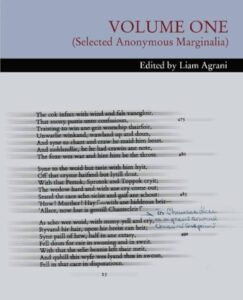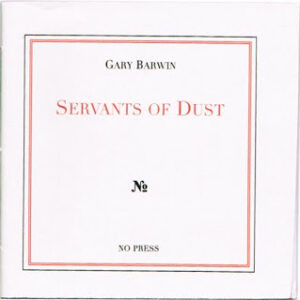No Content, in which will be discussed Volume One (Selected Anonymous Marginalia), Servants of Dust, and Autobiography: Volume One (1975-1993)
Liam Agrani // Gary Barwin // Ryan M. Haley
BlazeVOX, 2010 // No Press, 2010 // Ugly Ducking Presse, 2010
Reviewed by: Vanessa Place
August 4, 2010
// The Constant Critic Archive //
Today–and if you were children, I would call you children–we are going to consider the attractions of nothing that is very much worth considering. I have picked three books in the random fashion of things that appear in my mailbox, determined that they are, if not emblematic, interesting, and that they provide a platform for me, the reviewer, to opine freely about things about which I am inclined to opine. Nothing, in a word. For these are books in which content, that sausage-stuff so beloved by so many, is kept to a minimum. Allowing for the free play of materiality, in my book. Or in these books. So this is my vulgar plea for more that is less, for that which is sans lyric, sans meter, sans form, sans author, sans polemic, sans poetry, sans poet, sans everything but poetry. So that one may come to bury Barwin, and stay to praise him. There’s really no reason to read any further. However, if you must:
To synopsize (for what is a paean to minimalism if not an invitation toward reduction and its best friend, hyperbole), Volume One is a collection of “found language;” as described on the back of the book, the poems therein are composed* “solely of direct transcriptions of marginalia from libraries, used bookstores, and various other places.” Various other places is my middle name, and the collection here is as dear to me as the musty relative whose middle name I bear. The poems in Volume One are titled with their source-text, e.g., “Transcription Of Selected Marginalia Found In A 1963 Copy of The Poems of John Milton Published In 1953 The Ronald Press.” A delightful example:
p 35 Caligula
(“Complete Transcription Of The Marginalia Found In A 1975 Edition Of How To Do Things With Words By J.L. Austin (Found In a Western Massachusetts Bookstore).”)
Proving Eliot correct, the lesser poets cede the greatest derivative rewards:
p 2 Nonsense
You know you’re in for human
degradation, perversion through ignorance’s
human perversityp 4 waxes, lyric,
carried away
by his own
logic.p 5 science
likened
learn
gets nervousp 7 arm in arm
pilferers
manner
womb
stomachp 10 again, negative humor
p 11 the extra dishes
bring on troublep 13 lusty?
sexy?
courageous?
proud?p 15 In Chaucer there
is a great animal
chase at this pointp 16 No great
lover is ever
jealouswho
p 90 dismal
full of carecaused
to fallp 91 sexual desire
p 93 in haste
outcastp 94 oh Blasphemy!
p 95 like a bully
p 96 down
shows off
hope vs. despair
one eyelaughs
one weepsto comb your golden hair
a sign of idlenessp 97 the moon closest
to the earth is the
most fickle of
planets.(“Transcription of Marginalia Found In A 1963 Copy Of Robert Henryson’s Poems, Published BY Oxford University Press and Formerly Owned By John Collins.”)
The negative space, in this case, proving more positive than that occupied by paint. (See, “p 148 lack of / air in painter’s / place,” from “Transcription of Selected Marginalia Found In A Copy of Franz Kafka’s The Trial (Translation By Breon Mitchell) Published by Shocken In 1998.”)*

In a reversal of this chatty paradigm, Gary Barwin’s Servants of Dust is a collection of the punctuation of Sonnets 1 through 20, rendered spatially (oh, Mallarmé!), so that Sonnet 18 (“Shall I compare thee to a summer’s day?”) becomes:
18
inverted commaquestion mark
colon
comma
inverted commacolon
comma
inverted comma semicolon
colon
inverted commainverted comma semicolonsemicolon
inverted commacomma
colon
comma
period
And in that way, one can see the play of punctuation across the page, fitting like the darling buds of May–or any buds, for that matter–Sonnet 2 being particularly dashing, though full of caught breaths, while Sonnet 20 is more dense, love’s own woolen thicket, pudding-proof of the rush and pause and interpolations that is not only love, but is love that picks its own inversions, its sweet pushmi-pullu.

On the more temporally linear front, Autobiography is apparently a collection (what happy magpies we, sorting out eternity) of words introduced in la langue during each of the relevant years. “Apparently” because I could find no explanation in situ or on line. I imagine these are words that have entered through some entrenchment–OED or somesuch. I could be wrong about this, as I am about so many things. However, assuming I am right, as I am about so many other things, it is a work of great happiness. (And this is true in either case, just as being right or wrong is so often irrelevant to one’s pleasure.)* Haley, editor of UDP’s fine Lost Literature Series, is also a librarian in the “Miriam and Ira D. Wallach Division of Art, Prints, and Photographs at the Stephan A. Schwarzman Building of the New York Public Library,” and the work–to whom the volume is dedicated–is full of giddy pops and serious punctums:
pooch
poopy
post-feminism
pre-AIDS
prebender
prenup
propeller-head
protoctistan
pseudy
ptaquiloside
pum-pum
quadrathlon
rate-capping
razz
reader-friendly
repost
retroposon
Ruby Murray
SCART
sin-bin
softnomics
spell-check
surtitle
sysadmin
sysop
tech-head
telerobotic
threequel
toppish
trannie
transgendered
transgenderism
trimnasium
ubiquinate
upskill
urgicenter
veganic
voice-over
Waldsterben
WAN
word-wrapping(excerpt from “1983”)
While a worthy way to while away the socio-historical hours (transgendered (+) = trannie, (-) = transgenderism, providing a retrogressed understanding of why we believe an emoticon will suffice, and why it does, in fact, do), and a fine forum for lexi nostalgia (veiled in merciful mist is the year that brought both “big whoop” and “multifractal”) and word-hoarding (must have “pum-pum”), these poems are yet poems: by which I mean they are encore a manner of witnessing via language, a rhetorical transcription of the then that always serves as now. And vice versa.

The easy observation here is that each of these minimalist poetries acts as a rhetorical snapshot: something capturing the movement of language within language itself. How words frame off other words, or in the punctuated spaces that serve as connotation. This seems very Derrida to me, and insufficiently interesting. What is more marvelous is that the play of negative space is felt as negative space itself; I don’t reach for the source-text in either Servants of Dust or Volume One, don’t knit some narrative from Autobiography, don’t, in toto, go beyond the sheer material of the material presented. For while a great deal of jouissance may be had in discursing the Master (and polyvocalizing the University) in each of these texts, this is nothing, and much less, than staying on the surface. (It’s Clement-time, children, if you are children.) The problem with so much of what passes for poetry these days is that it drives itself home to the tune of cowbells and gjallarlhorns, and while I love a good toot as much as the next fellow yelling “What side are you on?”, it is also often necessary that there be a good deal less for there to be more. I want the inability to thumb up or down, the lack of “reading,” the actual absence of author and authority rather than a set of backflips and belly-beats that prove one’s modest virtuosity. Singularity all around me, and not a drop to drink. What these books do is make me think. Not about them, but about that speck that is me. You, too. Not in the trans-narcissism of what passes for intersubjectivity, but in the awful gape of what cannot be but merely comma, comma, inverted comma, quotation mark. That existence is had in the infra-thin chasm between “abductee” and “web site,” that my tombstone may well bear (if I am very lucky) many marginalia. That excrescence is the base of all art, and that what is multiple is the one carried about inside the cranium, the one that needs room to seethe.
____
* Agrani is described as poet/editor, and the slash is apt: for while some of these poems are self-executing (complete marginalia, e.g.), some are more carefully culled (“selected marginalia”). I have no opinion on the preferability of one technique over another, but note that they are wildly different aesthetics performed in the space of a single conceit by a (as far as I know) single author-function. This is admirable in my book, and well-played in his.
* It should be duly noted that this book was the subject of Ray McDaniel’s review this month, in which Mr. McD expresses a fair amount of ambivalence with regard to the poetry or not of this volume. Inasmuch as Mr. McD is addressing “readers,” he is wrestling in the right trunks. Inasmuch as I am uninterested in reading relative to this kind of work, I keep my hands to myself. I would note, however, that Mr. McD’s big-sister analogy with regard to conceptualism is incorrect: conceptualism is more akin to the one who asks you why you’re flinching when you’ve not been hit. Note, too, that I did not write “yet.”
* Later, I would learn that I was right. Again.
COMMENTS:
evie August 5, 2010 at 2:17 pm
Yes.
Once, when I was a young boy, my sister Conceptua walked up to me in the hallway of our childhood home. When I flinched, she asked me why.
“I — I,” I stammered.
“Are you afraid I’m going to hit you? Is that it?”
“I — no, I — ”
“That really makes me angry,” Conceptua said. And then she hit me.
This is how I learned to only ever express fair amounts of ambivalence.
In any case, readers are useful as a kind of universal solvent for writers. I thought you might like the idea of dissolved writers. But at least neither of us suffers ambiguity as to the wootworthiness of Volume One.
Ryan August 6, 2010 at 9:03 pm
vanessa,
thanks for the review. it is, in fact, the OED as source text. & i love your take on the dedication.
cheers,
ryan
Alexis October 20, 2010 at 9:09 am
Thanks for a great roundup, engagingly explored. Great to show the students and a keeper for me….
Alexis October 20, 2010 at 9:18 am
PS: I hope Vito Acconci gets to see Gary’s book.
Gary Barwin January 27, 2012 at 12:57 pm
Thanks very much for this great discussion. I really appreciate it.
There is now “Servants of Dust: the musical”!, a minimalist musical setting of the text, replete with synthesized voice. It’s here:
Best,
Gary